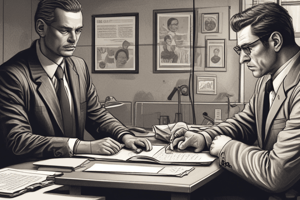Podcast
Questions and Answers
Why is it important for an officer to be aware of interviewer bias during an interview?
Why is it important for an officer to be aware of interviewer bias during an interview?
- It prevents preconceived ideas from influencing the interview. (correct)
- It helps in confirming the suspect's guilt.
- It ensures the suspect is interrogated more thoroughly.
- It allows the officer to challenge inconsistencies effectively.
What is one of the overriding rules regarding the interviewing of suspects?
What is one of the overriding rules regarding the interviewing of suspects?
- Officers can provide their interpretation of events.
- Interviews should focus primarily on proving guilt.
- Suspects should be challenged on inconsistencies immediately.
- Suspects must be given the chance to explain their version of events. (correct)
In the Confirm and Clarify phase, what should an officer aim to do with the suspect's account?
In the Confirm and Clarify phase, what should an officer aim to do with the suspect's account?
- Ensure critical aspects are clarified without misunderstanding. (correct)
- Confirm the guilt of the suspect based on their explanation.
- Disregard the suspect's explanation if it seems faulty.
- Challenge any contradictions immediately.
What should an officer avoid doing regarding suspected inconsistencies during an interview?
What should an officer avoid doing regarding suspected inconsistencies during an interview?
What is the potential consequence of a suspect being denied the opportunity to explain their account?
What is the potential consequence of a suspect being denied the opportunity to explain their account?
What is a key aspect of the Confirm and Clarify phase in suspect interviewing?
What is a key aspect of the Confirm and Clarify phase in suspect interviewing?
What is the responsibility of investigators when a suspect exercises the right to silence?
What is the responsibility of investigators when a suspect exercises the right to silence?
What is the first stage in the investigative process?
What is the first stage in the investigative process?
Which stage involves verifying information during an investigation?
Which stage involves verifying information during an investigation?
What does the P.R.I.C.E. model focus on?
What does the P.R.I.C.E. model focus on?
Why is it important to identify confidence levels in facts during an investigation?
Why is it important to identify confidence levels in facts during an investigation?
What information must the lead officer state at the beginning of an interview?
What information must the lead officer state at the beginning of an interview?
What is the purpose of analysing and evaluating fresh information gained from interviews?
What is the purpose of analysing and evaluating fresh information gained from interviews?
What is the purpose of confirming the replies given on the PIROS form?
What is the purpose of confirming the replies given on the PIROS form?
What should investigators do after collecting information from an interview?
What should investigators do after collecting information from an interview?
Which of the following is NOT a stage in the investigative process?
Which of the following is NOT a stage in the investigative process?
What key aspect should the officer ensure the accused understands regarding the caution?
What key aspect should the officer ensure the accused understands regarding the caution?
Which of the following is NOT a responsibility of the lead officer before an interview begins?
Which of the following is NOT a responsibility of the lead officer before an interview begins?
When should the common law caution be administered to the suspect?
When should the common law caution be administered to the suspect?
What should an officer do to confirm the accused's understanding of the caution?
What should an officer do to confirm the accused's understanding of the caution?
Why is it important for the officer to note who is present during the interview?
Why is it important for the officer to note who is present during the interview?
What is the purpose of the YES/NO SPIRAL during suspect interviews?
What is the purpose of the YES/NO SPIRAL during suspect interviews?
What is the primary function of the PIROS form in the interview process?
What is the primary function of the PIROS form in the interview process?
Which of the following is NOT a characteristic of the YES/NO SPIRAL?
Which of the following is NOT a characteristic of the YES/NO SPIRAL?
How should a suspect respond during the clarification stage of an interview?
How should a suspect respond during the clarification stage of an interview?
What should the interviewer do after obtaining information from the suspect?
What should the interviewer do after obtaining information from the suspect?
What is the main goal in seeking rational explanations for discrepancies during an evaluation?
What is the main goal in seeking rational explanations for discrepancies during an evaluation?
Which type of questions are recommended to be used in the YES/NO SPIRAL?
Which type of questions are recommended to be used in the YES/NO SPIRAL?
What should be avoided when conducting the YES/NO SPIRAL?
What should be avoided when conducting the YES/NO SPIRAL?
Why is it important for the interviewer to clarify the expectations to the suspect?
Why is it important for the interviewer to clarify the expectations to the suspect?
What is the primary purpose of starting an interview with an Impact Question?
What is the primary purpose of starting an interview with an Impact Question?
Which component of the interview focuses on the topics the suspect is willing to discuss?
Which component of the interview focuses on the topics the suspect is willing to discuss?
If a suspect does not respond to the caution or impact question, what should the interviewer do?
If a suspect does not respond to the caution or impact question, what should the interviewer do?
What phase of information gathering is primarily concerned with what the police want to learn from the suspect?
What phase of information gathering is primarily concerned with what the police want to learn from the suspect?
Which of the following best describes an Impact Question?
Which of the following best describes an Impact Question?
Why is it important for an interviewer to understand both the suspect's and police agendas?
Why is it important for an interviewer to understand both the suspect's and police agendas?
What is the potential risk of failing to engage a suspect after an unresponsive initial question?
What is the potential risk of failing to engage a suspect after an unresponsive initial question?
What is the significance of the specific question example given regarding the assault incident?
What is the significance of the specific question example given regarding the assault incident?
Flashcards are hidden until you start studying
Study Notes
Investigative Process Stages
- Gather, assess, and evaluate facts and information obtained during investigation.
- Identify confidence levels for each piece of information.
- Determine points needing proof while identifying gaps in the investigation.
- Recognize information that requires verification.
- Plan and prepare effectively for interviews.
- Collect information through the interviewing process.
- Analyze new information against existing evidence.
- Integrate new findings into the overall case.
- Make assessments regarding the suspect's status.
P.R.I.C.E. Model for Suspect Interviews
- Utilize the P.R.I.C.E. model to structure suspect interviews efficiently.
Information Gathering Protocol
- Record the time, date, and location of the interview along with present attendees.
- Review the PIROS form with the suspect prior to starting the interview.
- Administer the common law caution, ensuring the suspect understands their rights.
- Example caution: “You are going to be asked about an Assault to Severe Injury… You are not obliged to say anything…”
Interview Initiation
- Begin with an Impact Question to invite the suspect to provide their account of events.
- Example: “Tell me about your involvement in the Assault to Severe Injury…”
Questioning Phases
- The questioning phase involves two main agendas:
- Suspect's Agenda: Topics the suspect is willing to discuss regarding the incident.
- Police Agenda: Questions driven by the interviewer to gather necessary information.
Interviewing Best Practices
- Remain unbiased; avoid preconceived notions about the suspect.
- Maintain an open mindset as the suspect could be innocent.
- During the Confirm and Clarify phase, utilize the Yes/No Spiral to confirm details rather than challenge inconsistencies immediately.
- Allow the suspect to provide their narrative without interruption initially.
Confirmation Methodology
- Use closed questions to confirm critical aspects of the suspect’s account through the Yes/No Spiral.
- Ensure responses are only "Yes" or "No" to clarify key points.
- Focus on relevant and key points, avoiding unnecessary details.
Evaluation of Information
- Review and assess the information provided by the suspect in relation to existing evidence.
- Present discrepancies to the suspect and seek explanations for any inconsistencies.
Studying That Suits You
Use AI to generate personalized quizzes and flashcards to suit your learning preferences.




